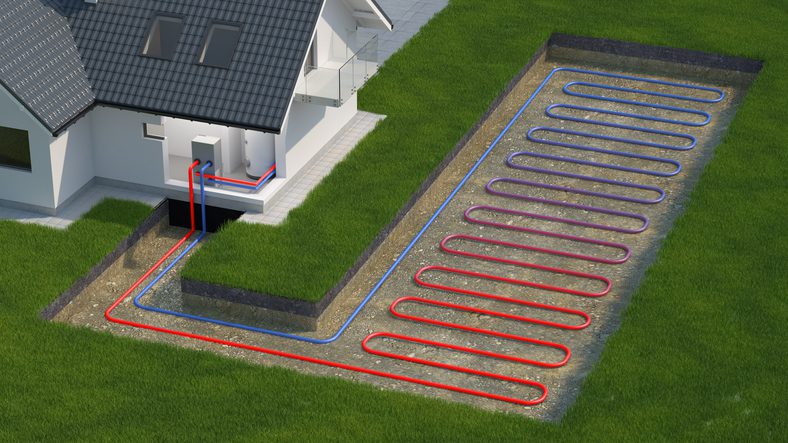How Much Does Geothermal Energy Cost In Maine?
What Is Geothermal Energy and Is It Right for Me?
Geothermal energy (sometimes referred to as ground source heat pumps or GeoThermal) is a type of renewable energy that comes from the Earth’s core.
It is created from the heat generated during the planet’s formation. Due to the ground absorbing heat better than the air, it can act as a heat sink or heat source in the case of a geothermal heat pump buried only two meters below the surface. This renewable resource is harvested to provide heating and cooling to homes and businesses.
This type of energy has long been considered sustainable due to the natural resources derived from it. Still, recent technological improvements have made it an even more attractive option compared to the traditional fossil fuels used in other energy production methods like coal and oil.
The U.S. Department of Energy estimates that almost 28 million homes across America could benefit from geothermal. And if you live in one of those homes or are considering installing it in your home, it is worth looking into!
If you’re thinking about installing geothermal energy in your home or business, this article will help you understand what exactly it is, how it works, and if it’s right for you.
Why is Geothermal energy considered a “clean” source of energy?
These systems are 100% carbon-neutral because there is no combustion. Since there are no combustible materials, Geothermal systems emit no carbon monoxide or carbon dioxide. A private solar collection system can generate electricity, or green power can be purchased through exchanges making the system 100% green.
Cost depends on a few different factors.
The true cost of installing geothermal in Maine can range greatly, from $45,000 to over $200,000. The price range depends on many factors, such as size and age of home, new construction, and the existing heating infrastructure of the home.
The complexity of your home, its age, and what type it is. For example, you might pay about $45,000 for geothermal if you live in a single-story ranch with a wide-open basement.
But if you’re trying to install it in an old three-story home that requires complicated duct work installation, you might be paying much more than $200,000.
Another factor to consider in Geothermal pricing is the option of multi-zone capabilities. Each zone costs around $2,000 to install.
Whether you’re building or considering Geothermal for your existing home, Geothermal should always be considered – the savings over 20 years is an economic slam dunk, and if you’re looking for a new heating system that is eco-friendly, geothermal is the way to go!
Are there any financial incentives I can take advantage of to help me save on my heating bill?
Homeowners in Maine can now deduct 26% of the total cost of purchasing and installing a geothermal heat pump system from their yearly federal income taxes for 2021 and 2022.
But you can’t start thinking about geothermal just because it is cost-effective. There are many other benefits to installing a geothermal heating system, including:
- Reliability- Power generated from this resource is easier to calculate because it doesn’t fluctuate like other energy sources, such as solar and wind. This means we can accurately predict the power output from a geothermal plant.
- No Fuel Required- Geothermal energy doesn’t require any kind of fuel since it is a naturally occurring resource, unlike fossil fuels that need to be mined or extracted.
- Environmentally Friendly- Geothermal energy is a cleaner and more eco-friendly energy source than other fossil fuels such as coal and gas. Additionally, the carbon footprint of a geothermal power plant is much lower. Compared to fossil fuels, the level of pollution from geothermal is minimal.
- Renewable- Geothermal energy is a renewable and sustainable form of energy that will last for about 5 billion years. That’s because the hot reservoirs within the Earth are constantly replenished.
How do we determine the size needed?
To determine the size of a Geothermal system, an analysis of the historical usage of fuel is the first step. For geothermal, it’s based on per ton of capacity.
A general rule of thumb in calculating how much capacity you need for your home is that every 200 gallons (711L) worth of oil used equates to one ton worth of gas or diesel equivalent storage (gge).
Can Geothermal work with my current radiator system?
The good news is Geothermal heating and cooling systems can work alongside both hydronic and forced air systems, but they do not work with baseboard heaters. The reason for this is that Geothermal heats water to around 120 degrees, while baseboard heaters require water temperatures of 180 or higher.
In this case, if you have an in-place baseboard system, you’ll need to convert it over before you can install a Geothermal system. However, if your home doesn’t have any kind of HVAC system, then installing a Geothermal unit will suffice as your primary heating and cooling source.
